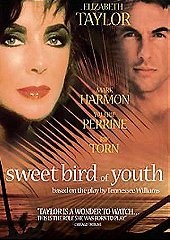This 1989 TV movie version of Sweet Bird of Youth adheres very closely to the original text of the Tennessee Williams play, but is missing something that resonates so deeply with the admirable-but-flawed 1962 movie version. There's plenty of fingers to be pointed as to why the flaws are so predominate, but it could just easily be a case of the individual sums not being strong enough to support the whole. No matter how great those individual sums looked on paper.
Elizabeth Taylor was already a legendary, iconic actress long before 1989, but casting her as an actress who was legendary but fading from the silver screen was an inspired bit of stunt casting. Taylor didn't have to do much in the role, she was the role. But that still doesn't excuse her sometimes lazy performance. Sure, there's moments of absolute brilliance and clarity in her rendering of the character, but the first chunk of the film is all campy affectations and Taylor relying upon her indomitable star power and not her acting chops.
But whoever decided that casting Mark Harmon was a good idea needs a good beating. While, yes, he is quite attractive to behold (and a nude scene early in the film is quite delicious), he does look every bit his 38 years at the time of filming. He brings nothing of the self-loathing, desperation and innate charisma that is required of the character. He's blandly there with an affected and bad accent hogging up precious screen time.
While the brutality and violence, isolation and sexual despair that the characters experience and cause each other to have adheres strictly to the text, this version oddly removes or reduces many of the secondary characters. Rip Torn gets the short-end of the stick by appearing as Boss Finley. The part is so underwritten in this version of the story that we wonder why he even bothered to show up at all. The whole storyline about Finley's white-washing of his family secrets to become a demagogic politician added a much needed bit of biting social commentary about the wider world. Sure, Taylor and Harmon's characters are symbolic of a kind of rot that can happen, but Finley was there to show how it crept in at the top and worked its way into every facet. It's a shame that so much of that story was removed as it also added to the characterization of Harmon's character.
And, lastly, there's the problem of the director: Nicholas Roeg. A director whose best work is narratively and visually complex and intricate here gets lazy and turns the whole thing into some kind of gauzy soap opera. Much of the true sex, violence and juicy stuff in the story happens off-screen and we're only told about it later. Why? In The Man Who Fell to Earth we're treated to David Bowie's alien becoming acquainted with every vice that mankind took centuries to master. He's done better work before and since this misfire. So we'll just chalk this one up to the fact that not every artist can create a masterpiece every time.
 Login
Login